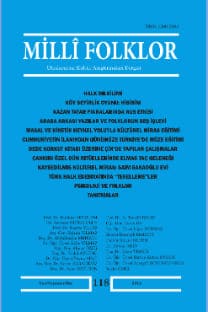100. yılında türk halk bilimi çalışmaları ve Türkiye kültür politikalarına eleştirel bir bakış
Halk bilimi; belli bir bölge, ülke veya daha geniş bir alanda geleneksel kültürün araştırılması, incelenmesi ve yaşatılarak genç kuşaklara aktarılmasını konu edinen bir bilim dalıdır. Türkiye’de, 20. yüzyılın başlarında, Ziya Gökalp, Fuad Köprülü ve Rıza Tevfik’in yazdığı tanıtıcı makalelerle başlayan “Türk halk bilimi” çalışmaları, lisans ve lisansüstü programlarda yetiştirilen genç halk bilimciler, ör- gün ve yaygın eğitim kurumları ve kültür çalışmalarına yönelik olarak kurulmuş sivil toplum kuruluş- larınca sürdürülmektedir. Türkiye’deki halk bilimi alanındaki çalışmaların bilimsel düzeyleri yüksek olsa da, oldukça dağınık ve öncelikleri ülke gereksinimlerine göre belirlenmemiştir. Bu nedenle, 2013 yılı itibariyle 100 yıllık bir geçmişe sahip olan Türk halk bilimi çalışmalarının 100 yıllık geçmişinin değerlendirilmesi ve 21. yüzyıldan itibaren geleceğinin şekillendirilmesine yönelik planlamanın yapıl- ması bir zorunluluktur. Bu ihtiyaçtan hareketle hazırladığımız bu makalede Türkiye’de halk bilimi çalışmalarının 100 yıllık tarihi içinde yapılan çalışmaların temel sorunları belirlenip, nedenleri tartı- şılmış ve olası çözümleri önerilmiştir.
A critique of the turkish folklore studies and cultural politics of Turkey in 100th anniversaries
Folklore is one of the social sciences whose subject matter is to study and to show how to carry from one generation to another the traditional culture in a region, a country or a wider area. Turkish folklore studies, which had begun with the introductory articles written by Ziya Gökalp, Fuad Köprülü and Rıza Tevfik, has been carried on by the young folklorist educated in the folklore programs of the universities, mass education programs of the government and the programs established by several NGO’s. Although the scientific level of those folklore studies in Turkey has been very high, most of the programs appear to be scattered, incomplete and the folklore studies in them have not been satisfying the demand and priorities of the country. Therefore, the folklore studies appear to be less scientific impact in the country. Departing from this point of view, it has become necessary to evaluate the 100th years old history of Turkish folklore studies, and in order to achieve the better folklore studies in the 21st century to determine the reasons for the problems and also suggest possible solutions for the de- termined problems. In this article, the most of important problems of Turkish folklore studies in 100th years are determined and discussed, and possible solutions are suggested.
___
Ekici, Metin. Halk Bilgisi (Folklor) Derleme ve İnceleme Yöntemleri. Ankara: Geleneksel Yayınları, 2007- ISSN: 1300-3984
- Yayın Aralığı: Yılda 4 Sayı
- Başlangıç: 1989
- Yayıncı: Geleneksel Yayıncılık Eğitim San. Tic. Ltd. Şti.
Sayıdaki Diğer Makaleler
Türk folkloruna dışarıdan bakmak: Türk folklor tarihinde yabancı folklor araştırmacıları
12 yılın üstüne ulusal halk festivali
Folklorun yüz yılında halk hekimliği çalışmalarına bir bakış
Türk folklor tarihinde gizli kalmış bir manifestocu: Abdülaziz bey ve kültür koruma yaklaşımı
Folklor çalışmalarının 100. yılında “folklor-milliyetçilik” ilişkisi üzerine bazı düşünceler
Elazığ masalları ve propp metodu
100. yılında türk halk bilimi çalışmaları ve Türkiye kültür politikalarına eleştirel bir bakış
